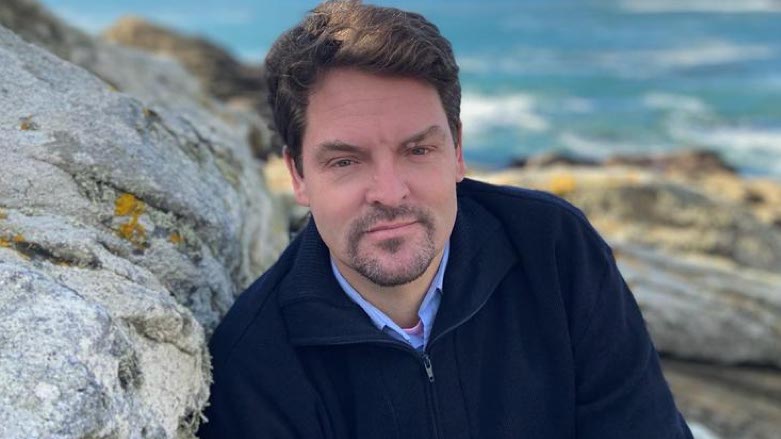New Dutch thriller focuses on stateless Kurds

ERBIL (Kurdistan 24) – In December of last year, Yvo Kühling, an author from the Netherlands published the novel ‘Het Verbond van Vijf’ (‘The Covenant of Five’), in which the Kurdish issue and that of other stateless minorities plays a central role.
“The Kurds are with so many and still they have no state nor vote. Same goes for the Tamils, Sikhs, Uyghurs, Rohingya and Tatars, just to name a few,” he told Kurdistan 24 English in an interview.
So far, the book is only published in Dutch, but there are plans to translate the book also to English.
Is this your first novel? How old are you?
With 52 years of age, I am -as they say- in my juvenile fifties. ‘Het Verbond van Vijf’ (‘The Covenant of Five’) is indeed my first novel. For years now I have maintained the habit of composing one poem a day. About anything that inspires me. I consider this my mental yoga. At a certain point, readers encouraged me to commit to writing a longer work of fiction. A couple of years ago, I decided the time was right.
Not many Dutch novelists know or write about the Kurds. Why did you decide to involve Kurdish issue in your novel?
Once in the late nineties I ended up with my car in a demonstration. I saw people holding banners and waving with a flag I did not recognize. I started to read about the Kurdisch issue and wondered why the world is constituted in nation states. That minorities have no clear representation always stuck with me. I knew that one day I wanted to write about it, a story with a fast pace and quick turn of events. In my book, the Kurdish issue and that of countless other minorities became the central theme. The Kurds are with so many and still they have no state nor vote. Same goes for the Tamils, Sikhs, Uyghurs, Rohingya and Tatars, just to name a few.
In your book you focus on the United Nations and the fact that only nation-states can be admitted membership to the UN, not peoples without a state. Why did you decide to write about this specific subject?
Because I consider this a flaw in our current world order. If all unrepresented people unite, they form the third biggest country in the world. The Charter of the United Nations talks about equal rights for all, but people without a nation state are left without a vote. In my book the United Nations is pressured to change from within, to figure out a system that works for everybody and solve the issue of minority representation.
One of the main characters in your book is Naza, a Kurdish lady from Erbil. Many of your descriptions of Erbil and Kurdistan are very accurate. How did you get this information?
Through research and talking to a lot of people. Erbil is one of the few places in the book I actually have not visited. I read about it and tried to put an image together. I wanted people from Kurdistan to recognize what I wrote about their homeland. In my writing process I often asked proof readers if they found ‘Het Verbond van Vijf’ credible enough. They knew it was fiction, but wanted to believe the story happened in the way I described it. That was enough encouragement for me.
You write in your book that it was difficult for a Kurdish Muslim lady like Naza to live in a male-dominated society in Erbil. Is this personality based on a real person?
Most characters in the book are based on people I know. I borrowed certain personality traits or character peculiarities here and there to shape the main cast. Naza as the protagonist in my book is a fictional character as such, but she easily could have existed. I gave her many talents, yet she wears scars of her youth as well. Once upon a lecture, a Kurdish man in the audience told me that Naza sounded exactly like his daughter. Naza’s life is no fairy tale. She lived through a lot of difficulties, within her country and family as well. I wanted to give her a credible background, so readers could identify with her. Her personal history is that of many Kurdish people.
Did you also go to Erbil to learn more about the Kurds? Or are you planning to visit Kurdistan in the future?
As you are aware, the current situation in Iraq is very volatile. If things settle down, I would love to celebrate Newroz in Kurdistan. I look forward to seeing the sun rise over the Erbil citadel as Naza did in her highschool years. I am sure it will happen one day.
You write that Kurds are considered as ground troops of the West, but do not get real support. Why did you write this?
I am an author, not a political activist. My book is a thriller in which the root of the conflict is not West versus East, but those in power versus those without voice. I mentioned the war in Syria in my book to explain how Naza developed as a character. She has a mission in life, based on everything she lived through in her formative years. The other protagonist in the book comes from a worry free neighbourhood in Amsterdam. They are complete opposites and team up to solve a mystery together.
How is the reaction so far from Dutch Kurds or Dutch readers?
When I gave a talk about the book for a local Kurdish community, the crowd recognized an authentic voice of someone who would like to see the world change for the better. Reviews in the main Dutch media have been overwhelmingly positive. Dutch readers have embraced the book as a good read about a relevant topic. By the way, the English translation is still a work in progress.
